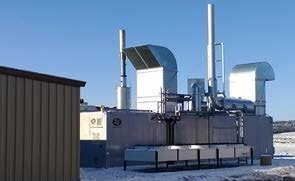Wisconsin dairy farm turns cow manure into biogas energy
2G Energy supplied the biogas CHP module, gas treatment system, thermal heat distribution system, and controls and switchgear.
Facts & figures

The University of Wisconsin Oshkosh and BioFerm collaborated to create an anaerobic biodigester at Rosendale Dairy in Wisconsin, which is the largest dairy farm in the state situated in Pickett. The plant generates energy from the methane gas produced during the decomposition of dairy cow manure. The project operates as a remote UWO biology teaching, learning, and research laboratory, and also has a public education center. Some of the revenue generated from the sale of energy is utilized for student scholarships, campus laboratory enhancement, facility expansion, and the creation of an innovative center for rural community development. BioFerm/Schmack (Viessmann Group) designed and constructed the biogas anaerobic digester.
For this project, 2G Energy Inc. supplied a complete biogas CHP module that consists of a 50-foot sound-attenuated container with a fully integrated 2G Avus 1426 Jenbacher engine as the primary mover. The CHP cogeneration system generates Electrical Power of 1,426 ekW/h or 11,836 MW p.a. and Thermal Power of 1,533 kWh/th. 2G also supplied the complete gas treatment system, including cooler, dryer/dehumidification, reheating, and the H2S removal system. The customer decided to install the 2G Thermal Heat Distribution System, including a Hydronic Junction, which ensures that the CHP maintains optimum thermal performance in different load situations. This advanced technology decouples the primary heating source circuit from the secondary consumer circuit, achieving consistent function in all operating states. 2G THDA's provide the most energy-efficient heat transfer. The system also allows for tighter temperature control because of the infinite system's ability to regulate temperatures gradually. The controls and switchgear, including utility interconnection, are also provided by 2G Energy.


